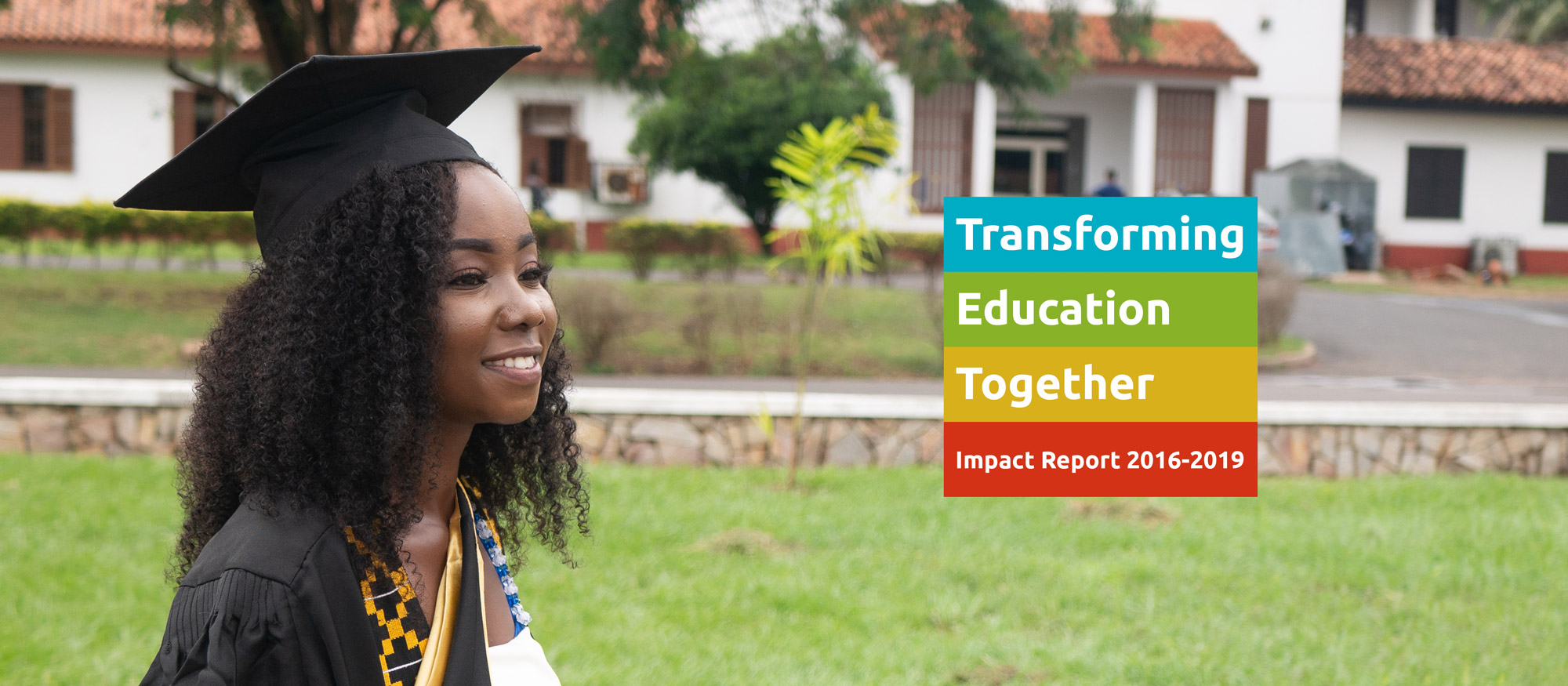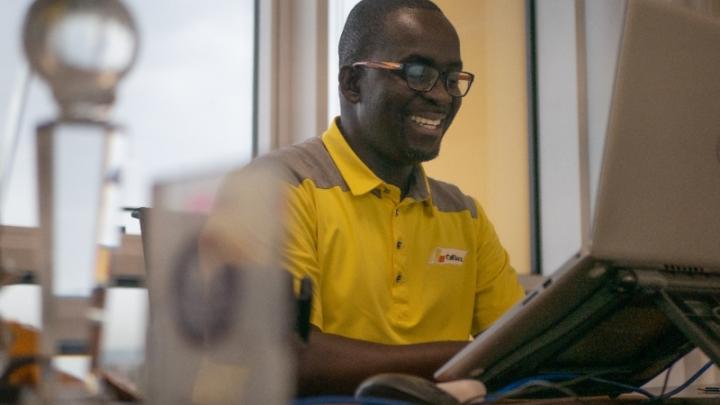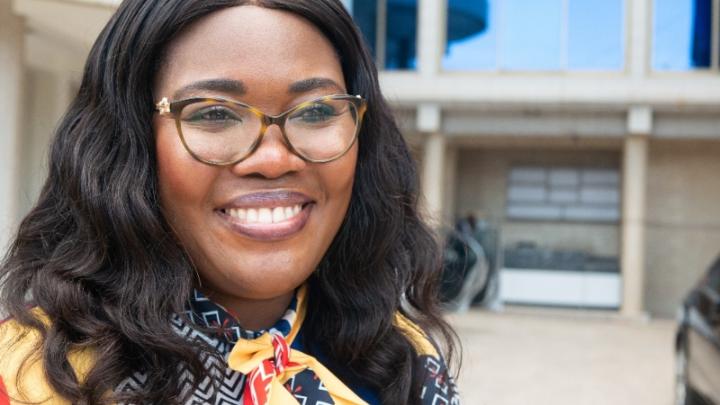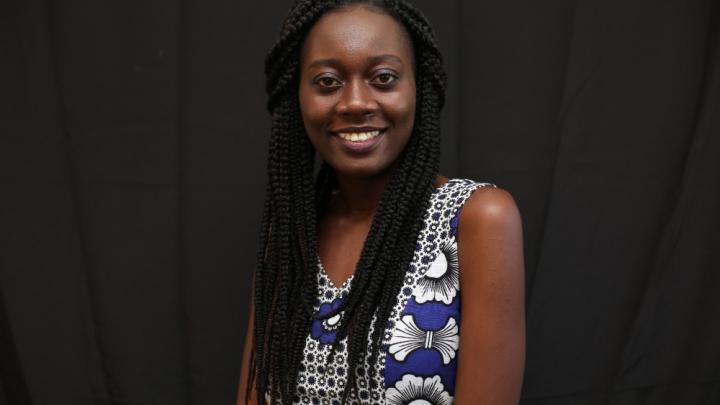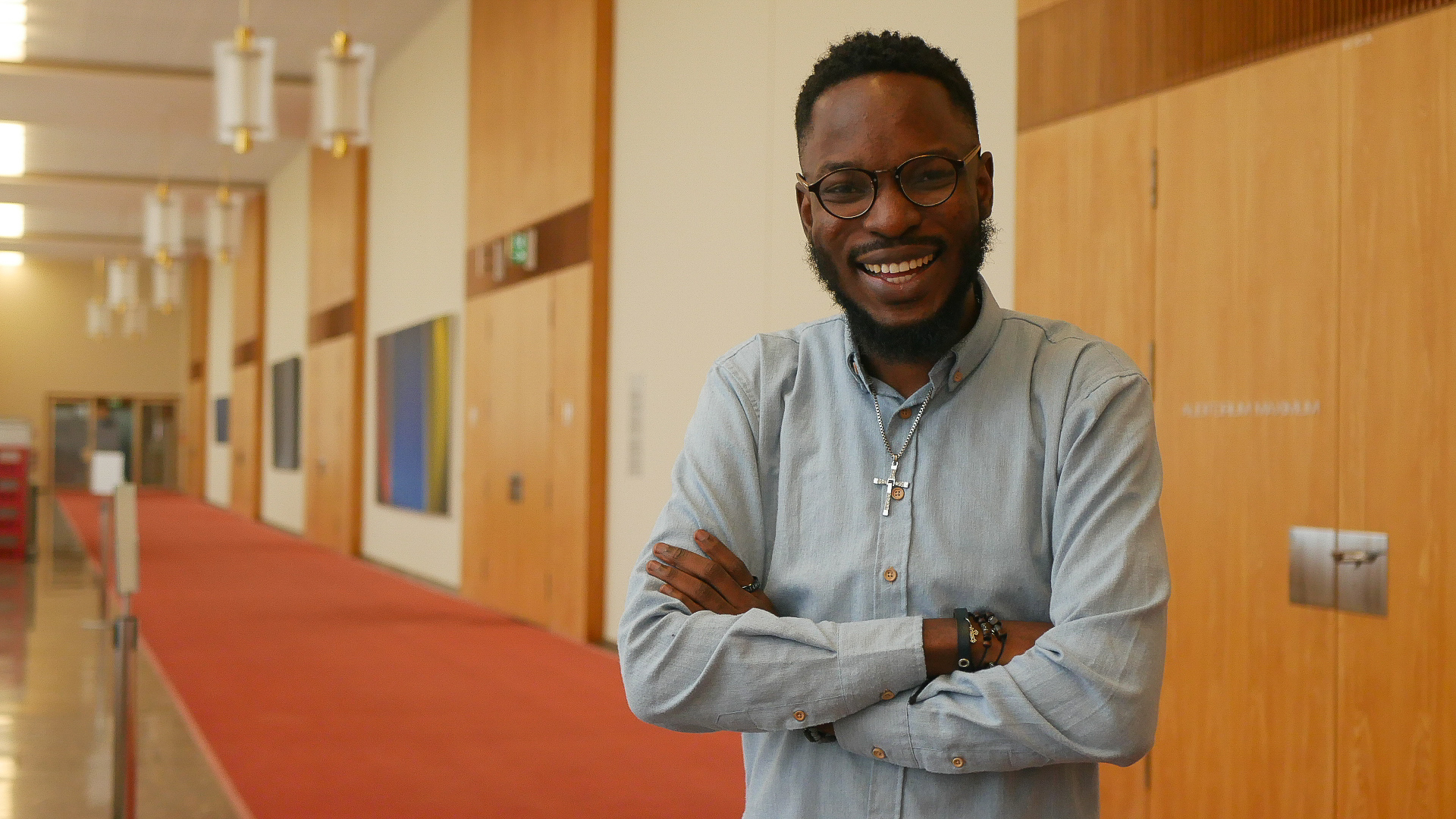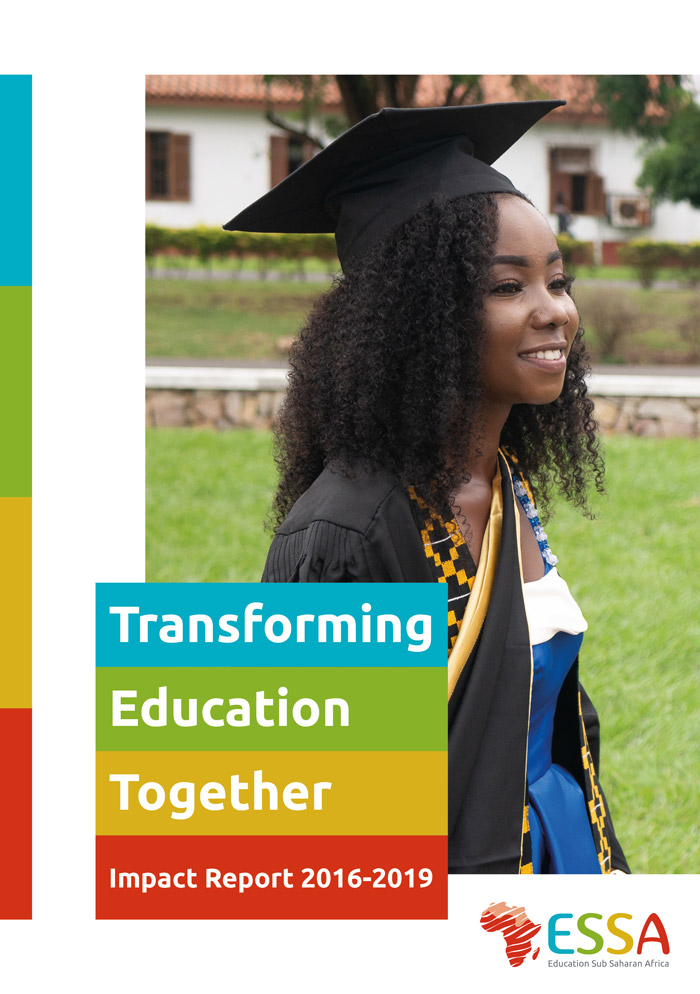Welcome
We are proud to present ESSA’s first digital Impact Report, giving an overview of our contribution towards transforming tertiary education in sub-Saharan Africa.-
We have taken important steps to address critical issues, thanks to the calibre and commitment of our partners and funders.
Quality education and work will drive sub-Saharan Africa’s future
By 2050, Africa’s young population will increase by nearly 50 percent, and 450 million workers are projected to join the workforce in the next decade. Access to quality education and job opportunities will be critical in determining whether the world’s largest youth population becomes an extraordinary opportunity to lift millions from poverty, or a major crisis for the region and the world.
Focus on tertiary education and its link to the labour-market
Colleges, universities, and vocational courses play an important role in building the skills and knowledge of young people for the world of work.
Our initial three focus areas address complex issues for long-term change:
-
Research on education by researchers in sub-Saharan Africa used to change policy and improve education.
-
The shortfall of academics and staff in tertiary education.
-
The effectiveness and accessibility of scholarships for young people.
Our contribution: join-up, inform and inspire to increase impact
We are inspiring those who work within education and those with the resources to improve it, to work together. More than ever, decisions should be taken based on evidence that can be scaled up to improve the most lives.
We hope you are inspired by our work so far. If you would like to share your ideas, skills, or partner more formally with us, please do get in touch.
Olaf Hahn and Patrick Dunne
Chief Executive Officer and Chair, ESSA
-
"ESSA has developed tremendously over the last three years. The seed-funding provided by us is offering high return on investment. I am excited to see ESSA growing further, to produce high impact for tertiary education in sub-Saharan Africa."
Joachim Rogall, President and CEO, Robert Bosch Stiftung
Stories
Professor Goski Alabi, lecturer and academic at the University of Professional Studies in Ghana, Sepiso Dean Mwamelo, an intern at ESSA working on social inclusion within scholarships, and Samuel K. Boafo, Head of Human Resource (HR) in Cal Bank in Ghana, tell their stories about social inclusion and the tertiary education system in sub-Saharan Africa.
“ESSA has been born out of teaching learners and training teachers in schools like ours. The idea that something so bold has been sparked and shaped by our views and those of the learners is inspiring.”
Magdalene Mtwele, Mafiga Teacher School, Tanzania
Our vision
High-quality education in sub-Saharan Africa enables young people to achieve their ambitions and strengthens society.
Our mission
Our mission starts with universities and colleges, using data and evidence to drive the change needed to improve education for young people.
WHAT WE DO
We identify the biggest issues in education, driven by needs of young people, educators and employers.
We join up those with power and influence: from governments in sub-Saharan Africa, to leaders in universities and colleges. We support them to use evidence to maximise their resources and attract investment.
By working together we turn evidence into action: improving education policies and delivery.
Our MODEL
-
Identify the biggest issues in tertiary education
-
Build influential partnerships with organisations in Africa and beyond
-
Understand what data and evidence is needed for change
-
Turn data and evidence into practical solutions
-
Harness the power of Africa’s universities, colleges, and businesses to advocate solutions at scale
-
Improve education and increase work for young people in sub-Saharan Africa
Our work is aligned to Sustainable Development Goals: Quality Education and Decent Work, and the Africa Union Agenda 2063.
Our impact
We operate a cost-effective approach with a small, driven team working remotely around the world. Since start up, 33 students from across sub-Saharan Africa have worked with ESSA on our paid internship programme.In our first three years we have worked on three complex areas to prove our model:
-
1. We have made vital research on education by scholars in sub-Saharan Africa more accessible
There is a wealth of research on education by researchers in sub-Saharan Africa. But this research is often not sufficiently used nationally, regionally or globally to solve challenges in education.
Our contribution towards solving this issue:
-
Our first step has been to join up researchers in sub-Saharan Africa with researchers globally. This includes supporting the Ivorian Association of Researchers in Education to map education research from Côte d’Ivoire and ensure it is used around the world.
-
Alongside the Equitable Access and Learning Centre (REAL) at the University of Cambridge, we created The African Education Research Database (AERD). This is the first online database of education research by scholars in sub-Saharan Africa, profiling over 3,600 pieces of their work.
-
This evidence can be used to change policies and solve challenges in education. The database highlights gaps in education research. This is particularly crucial for under researched areas identified in the database (such as education in conflict).
Our next steps to achieving wider impact:
-
This work has uncovered key focus areas for investment in research, such as the need for a more inclusive research community with gender equality at its heart.
-
We continue to support the network of researchers to inspire policy change in tertiary education
-
-
2. We have successfully measured the faculty shortfall in colleges and universities in Ghana, which can be used across the continent
Colleges and universities in sub-Saharan Africa do not have enough staff to meet the increasing demand for education. As a result, many young people in sub-Saharan Africa will not get a quality education or skills for employment.
Our contribution towards solving this issue:
-
Our first step was to gather evidence on current faculty by looking at policies such as student-teacher ratio, faculty gender and faculty subject area. We worked in Ghana initially as enrolment rates in universities and colleges across the country are growing rapidly.
-
To do this we joined-up a network of expert partners consisting of the Association of African Universities (AAU), the Ghanaian National Council on Tertiary Education (NCTE), the Population Reference Bureau (PRB, a leading research institution on demographics), and with support from the Mastercard Foundation. Together we completed a pilot-study, the ‘Demographics of Faculty’, which analysed data from 213 universities and colleges in the country.
-
The study has informed the Ghanaian government and its education institutions with a detailed analysis of their current faculty situation.
Our next steps to achieving wider impact:
-
We will continue to work with our partners, with the addition of our new partner the Inter University Council of East Africa (IUECA), to expand our work to other countries in sub-Saharan Africa. Together we will strengthen educational institutions and increase investment in tertiary education.
-
We are developing tools for colleges, universities and organisations to plan resource allocation for student enrolment We will initially use these tools in Ghana, then adapt for other countries in sub-Saharan Africa.
-
-
3. We mapped the effectiveness and accessibility of scholarships for young people in sub-Saharan Africa
As demand for education surges in the world’s youngest continent, scholarships for students are increasing too. Yet there is limited evidence to know whether scholarships are supporting young people to join the workforce and little tracking of the return on investment of funding.
Our contribution to solving this issue:
-
We carried out leading work by researching over 350 providers who offer scholarships to students in sub-Saharan Africa, learning best practice from them.
The main challenges we found were:
-
Accessibility of scholarships for the most marginalised.
-
A lack of tracking the impact of scholarships on wider society.
-
Low completion rates.
-
Engagement between scholarship providers, universities and students.
-
Linking scholarship graduates with decent work.
-
Based on these challenges we developed a set of key performance indicators (KPIs) for social inclusion within scholarship programming, providing guidance to providers and funders.
Our next steps to achieving wider impact:
-
This work has fed directly into UNESCO’s 2020 Global Education Monitoring (GEM) Report on Education & Inclusion, launching in April 2020. Our findings will be publicly shared within this report in section 4.b.
-
Our focus is to continue to join-up a community of experts with a shared vision for increasing the quality and impact of scholarships for students from sub-Saharan Africa.
-
In addition, we are launching a web platform matching students in sub- Saharan Africa with scholarship opportunities.
-
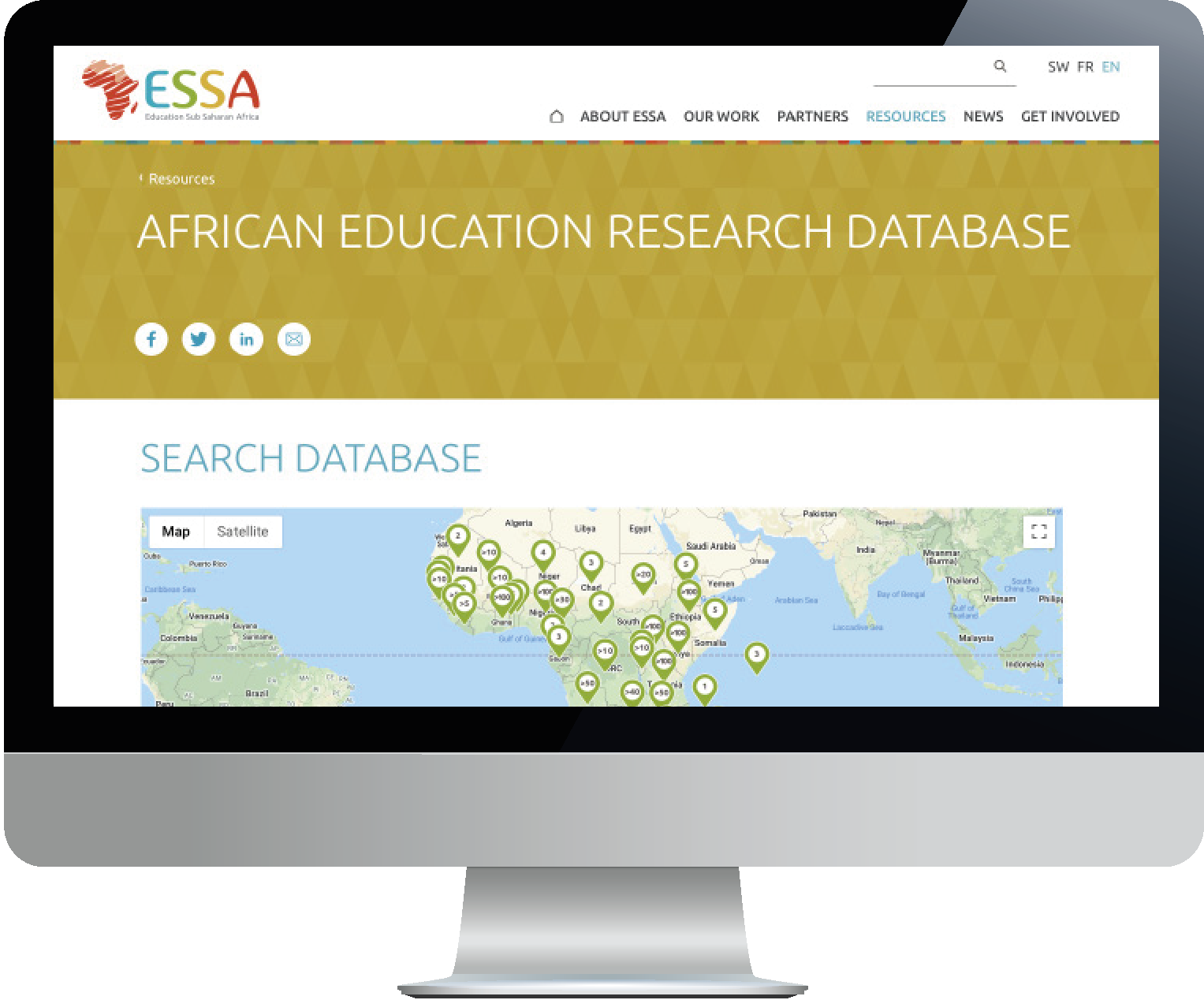
The African Education Research Database
The database was developed by the Research for Equitable Access and Learning (REAL) Centre, Faculty of Education, University of Cambridge, in partnership with ESSA.
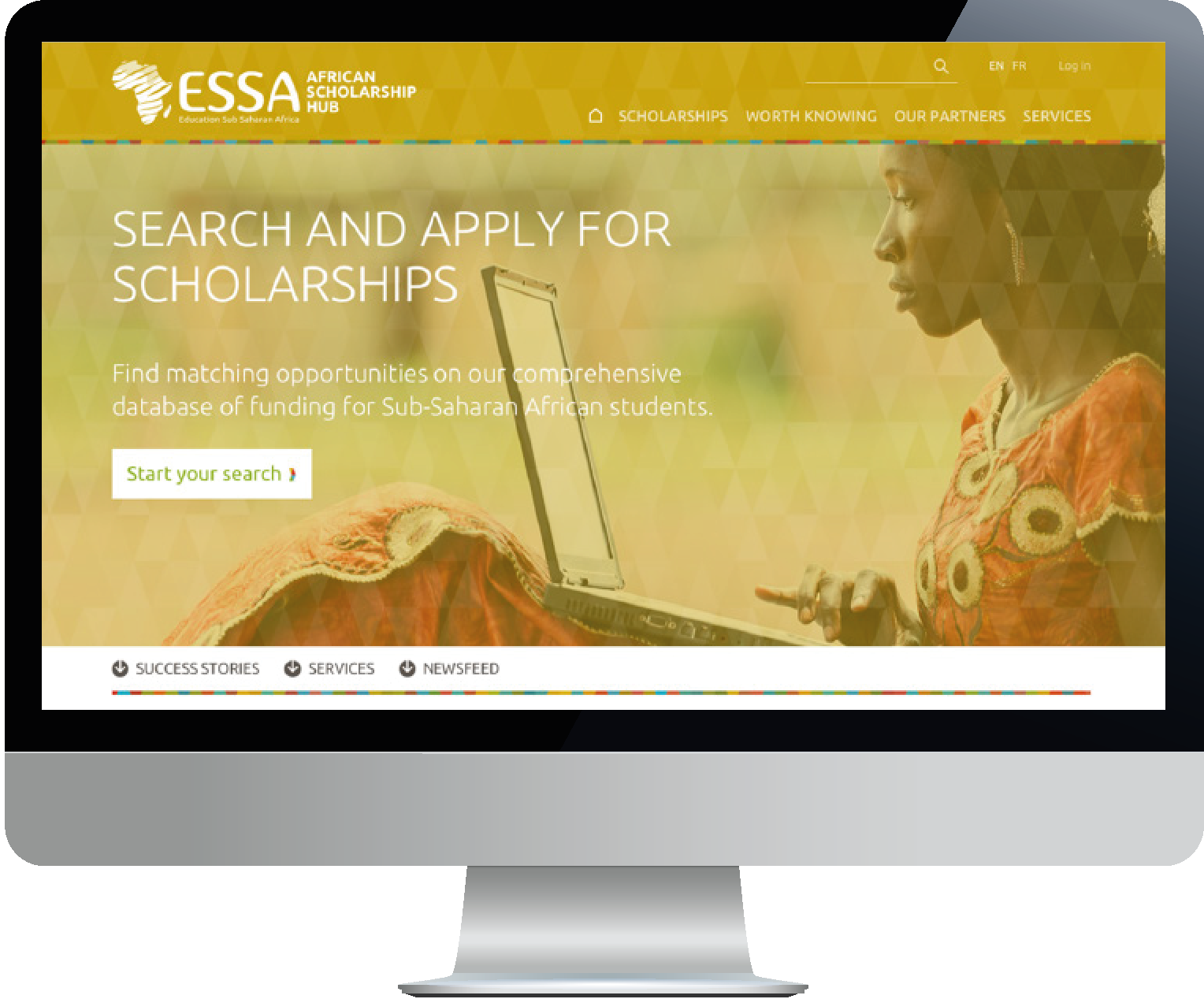
ESSA Sub-Saharan Scholarship Hub
Our online database matching students in sub-Saharan Africa with scholarship opportunities.
Graph to show the projection of faculty needed to meet policy goals in Ghana in 2025
Data in the graph below is from the Demographics of African Faculty study representing a prediction of how many more faculty Ghana will need by 2025, based on estimated student population growth.
-
Graph Legend: Projection of faculty needed to meet policy goals in Ghana in 2025
-
Faculty to replace those who leave: Faculty needed to replace those who leave their positions (assumes that 5% of professors and 10% of academic teaching staff leave each academic year).
-
Annual Enrolment Growth: Faculty needed to meet the growth in student enrolment (assumes a constant annual 5% increase in enrolment).
-
Unverified, unproductive and multiple job holders: Faculty needed to account for those who are on payroll of universities but cannot be verified (ghosts), those who are not productive (zombies), and those who hold multiple teaching/research jobs (moonlighters)(assumes that current faculty are overestimated by 5% for these reasons).
-
Faculty by Discipline: Faculty needed to meet policy norms on the distribution of students across disciplines (60% of students in Sciences and 40% in Humanities and Social Sciences) and achieve Student-Teacher Ratio policy norms.
-
Student-Teacher Ratio: Faculty needed to meet disaggregated policy norms for student teacher ratios (18:1 in Sciences, 27:1 in Humanities and Social Sciences).
-
Gender Equity: Faculty needed to have gender equity among full time teaching staff (assumes that faculty projections for 2025 will maintain the current gender ratio and that an additional increase in female hiring is needed to achieve parity).
-
Year Ahead
We’re looking at an exciting 2020.
In order to create real change, we will increase our emphasis on building networks and establishing strong links with policymakers. We continue to expand on our current areas of work, taking the next steps to achieve impact in sub-Saharan Africa.
In addition, with significant support from Dubai Cares, we are starting to work on new focus areas in 2020:
-
Leadership in education with an emphasis on female leadership.
-
The impact of business engagement and internships for young people to access the world of work.
-
Establishing a monitoring and evaluation approach for the organisation to track impact.
To do this, we will build capabilities within the organisation and through new partnerships.
If you would like to help us with this, please get in touch.
“We believe this first ever intervention in tertiary education by Dubai Cares will help connect students and graduates to employment opportunities and will be central to developing successful and sustainable economies and societies.
This programme, which is in partnership with ESSA, presents an exciting opportunity for Dubai Cares to play a leading international role in contributing to the academic success of millions of students, boost employment in the long-term, and help achieve the Sustainable Development Goals in Africa.”
HE Dr. Tariq Al Gurg, Chief Executive Officer from Dubai Cares
Women in Leadership - Life as a female Professor
Professor Goski Alabi is a professor at Laweh Open University College in Accra, Ghana.
THANK YOU
We would like to thank our partners, funders and private donors for their continued support.
